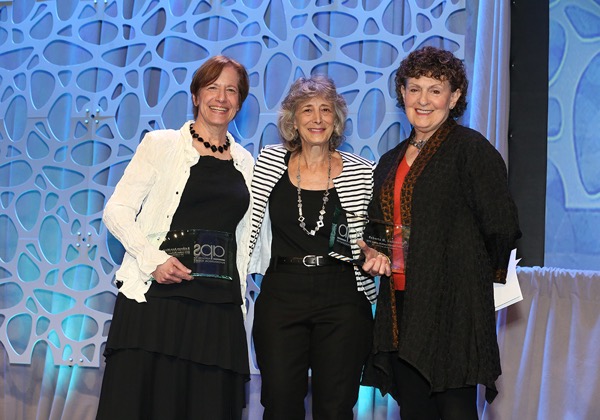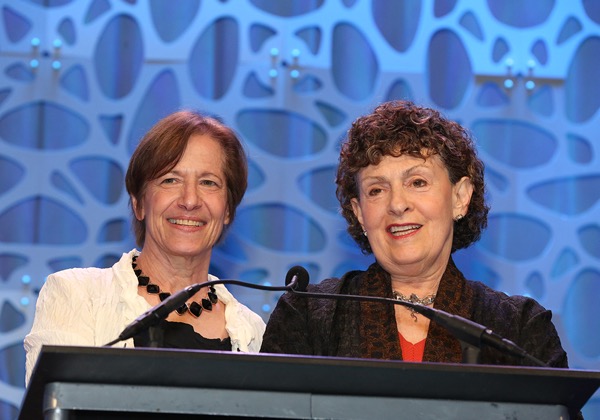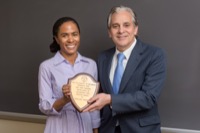


Lifetime achievement award
UD's Golinkoff recognized by Association for Psychological Science
11:32 a.m., May 28, 2015--The University of Delaware’s Roberta Golinkoff, Unidel H. Rodney Sharp Chair in the School of Education, has been unlocking the secrets of young minds for over 40 years through research and play.
Golinkoff and her long-time collaborator Kathryn Hirsh-Pasek, professor of psychology at Temple University, have dedicated their careers to conducting groundbreaking research on language, literacy, education and spatial development changes in the field of developmental psychology in infants and young children.
Honors Stories
National Medal of Science
Warren Award
In recognition of their work, Golinkoff and Hirsh-Pasek have been presented the James McKeen Cattell Fellow Award, the highest honor conferred by the Association for Psychological Science (APS), for “a lifetime of outstanding contributions to applied psychological research.”
In the late 1980s, the duo introduced an innovative methodological contribution, the Intermodal Preferential Looking Paradigm (IPLP). Through the use of side-by-side visual stimuli on a television screen and a single auditory stimulus, researchers were able to observe whether pre-verbal infants could match what they heard with one of the events they saw on the screen.
“Before IPLP we really couldn’t understand what it is kids knew about language before they speak. Now, we can use their gaze patterns to see if they can match the language with the one of the events,” said Golinkoff.
From that, Golinkoff and Hirsh-Pasek moved on to show that preschoolers learn best from play and playful learning. In 2010, they conducted the Ultimate Block Party in New York City’s Central Park. Over 50,000 families participated in child-friendly activities illustrating the value of play and playful learning. Subsequent Block Parties were held in Baltimore and Toronto.
“For over 30 years, Roberta and I have used our science to help each child reach his or her potential. The more we know, the more we can fashion programs to help every child succeed,” said Hirsh-Pasek. “I cannot put into words what an honor it is to work with a best friend who shares your passion and your values.”
With the University since 1974, Golinkoff holds joint appointments in the College of Education and Human Development and in the Department of Psychological and Brain Sciences and the Department of Linguistics and Cognitive Science in the College of Arts and Sciences.
She also is the director of the Child’s Play Learning and Development Lab, formerly known as the Infant Language Project. The lab explores the intricate aspects of the language-learning process, cognitive development, and how children develop spatial concepts through play.
In addition to receiving the Cattell Award this year, Golinkoff also won the Distinguished Scientific Lecturer Award of the American Psychological Association.
In 2011, she was presented UD’s Francis Alison Award, the University’s highest competitive faculty honor, and she has been the recipient of the John Simon Guggenheim Fellowship and the Urie Bronfenbrenner Award.
She is a principal investigator on an Institute of Education Sciences Postdoctoral Training Grant, co-chair with Hirsh-Pasek of the Frontiers of Innovation Working Group on Playful Learning at Harvard University, author of numerous books and publications, and is invited to speak at conferences and institutes around the globe.
While dedicated to her own work, Golinkoff is also extremely supportive of her students’ efforts, encouraging both undergraduates and graduate students in their scholarly pursuits.
“Working with Prof. Golinkoff is really great,” said Maya Marzouk, Child’s Play Lab coordinator. “Conducting research with kids is challenging, because you don’t want to influence their answers and skew the data. I feel as though I’m learning so much working here.”
Golinkoff and Hirsh-Pasek were presented the Cattell Award on May 21, at the annual APS Convention held in New York. They delivered a joint presentation, “Living in Pasteur’s Quadrant: Navigating the Uncharted Waters Between Basic and Applied Research.”
“It is so nice to have one’s colleagues acknowledge your contributions. There are so many other wonderful people in my field, it is an honor to be recognized in this way,” said Golinkoff.
Article by Elizabeth Adams
Photos courtesy of the Association for Psychological Science









